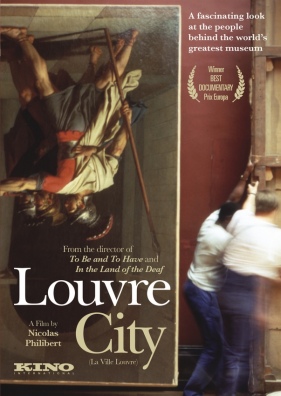Louvre City
Directed by Nicolas Philibert
LOUVRE CITY takes the form of one of the classic symphonies of the 1920s, which begin at daybreak, end at nightfall, and chronicle the lives of urban dwellers at work and at play.
The mighty Louvre, housed in a medieval castle, with its miles of hallways and hundreds of employees, does seem like its own city-state in this elegantly filmed documentary. Rather than focus on its familiar role as a monument to high culture, director Nicolas Philibert (To Be and to Have) shows us the everyday life of the museum and how it operates. As workmen puzzle over how to move and unfold massive canvases and medieval tapestries, African women joke about the fashion quotient of their security guard uniforms. Maintenance staff play pétanque (a French game similar to Bocce) in the Louvre's inner courtyards during their break, while the kitchen staff prepares food for the museum's café. We see the painstaking process of art restoration and the research involved in creating an exhibit. The class hierarchy reveals itself as curators and their assistants argue over the placement of pictures, while workmen wait patiently for a decision.
When Philibert finally allows the audience a moment to contemplate the Louvre's most famous and familiar objects, Winged Victory or the Mona Lisa, we see them not just as icons of aesthetic beauty, but objects whose preservation requires a great deal of effort and labor. Far from being didactic, LOUVRE CITY is a celebration of the ordinary processes of work in an extraordinary setting.
Reviews
“The works of art, revealed in a new context, come alive as fragile and exotic creatures captured in a web of human labor.” - Leslie Camhi, The New York Times.
Awards
WINNER: BEST DOCUMENTARY; Prix Europa

